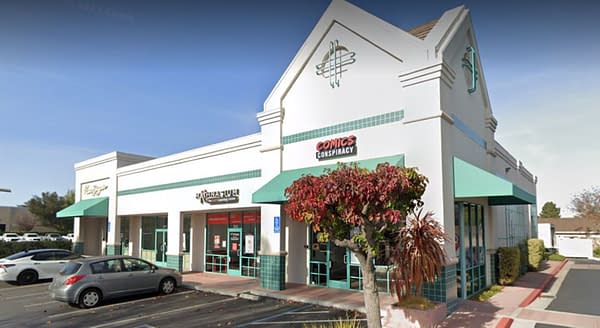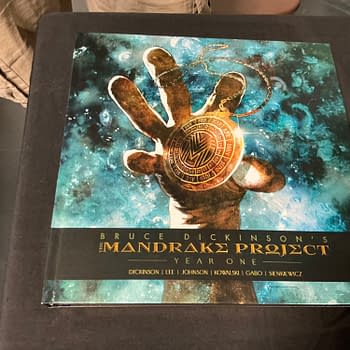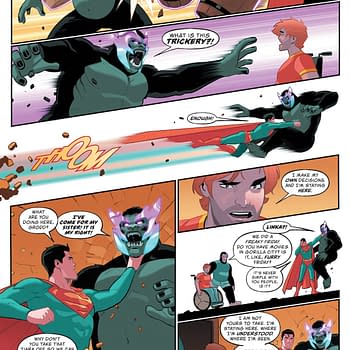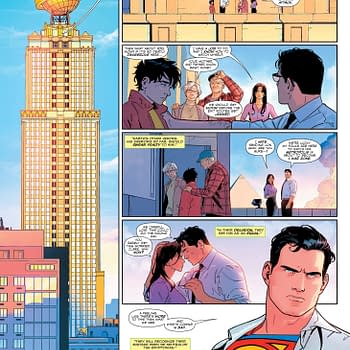Posted in: Antarctic Press, Comics, Comics Publishers, Current News, DC Comics, Marvel Comics | Tagged: comic shop, comics conspiracy, icv2, wattpad webtoon studios, Webtoon
Comic Book Retailers (& Publishers) Say The Funniest Things Part Three
Bleeding Cool published Comic Book Retailers Say The Funniest Things Part One and Part Two. But they keep saying funny things.
Article Summary
- Comic retailers & publishers join the dialogue on the industry's evolution and challenges.
- Insights highlight issues like audience shifts and the impact of economic hurdles.
- Proposals emerge for retailer support and adapting to modern content consumption.
- Discourse shows comic industry's resilience and willingness to confront its future.
Over the weekend, Bleeding Cool published Comic Book Retailers Say The Funniest Things Part One and Part Two. But they keep saying funny things and now publishers are joining them. Ryan Higgins, owner of the comic book store Comics Conspiracy posted on Bsky in a response to Part Two;

"Just pure bigotry from many retailers these days. I'd prefer the whole industry burn tomorrow than side with them. Go back whatever garbage CG has on indiegogo and get out of the industry. Keep publishing this stuff @richjohnston.bsky.social."
Well, what's good for the goose is good for the gander. Because Ryan continued to post,
"And look, despite being in one of the most liberal areas in the country, our best-selling comics are all by middle-aged, straight white guys. My customers aren't buying Iceman or Tim Drake either. There's a reason those books get canceled quickly. But Marvel and DC *have* to try. They're going to keep reaching out to new audiences because mid-40s straight white guys like myself eventually stop reading–usually when we're dead. Now, you can argue about quality, which is a concern. There's lots of bad comics out there. But there always is. Sales on Amazing Spider-Man aren't falling because of some woke propaganda. DC didn't take a major hit during Knight Terrors because of some gay character. There's quality and editorial concerns for sure–again, like there always has been. Things like the post-pandemic opening up of travel and sports, and the recent economic rollercoaster cause way more problems. Targeted hate groups like CG will pull some fence-sitters away from the industry. Pandemic-driven speculation and subsequently people cutting back when their investments don't pan out are likely hurting the indie companies more than anything, but I don't see how cutting all-new comics helps you. They're all just such extreme reactions to a multitude of problems."
Other folks across the industry have also been pitching in. Executive editor and SVP of Marvel Comics. Tom Brevoort took to his newsletter on Substack to say
"Forget about comic books, retailing of any sort is an extremely difficult vocation in 2023, following on the heels of a global pandemic and lockdown that disrupted regular buying patterns. Everybody wants to move on and pretend that nothing happened, that everything is back to normal, but it isn't—the time that will take is a lot longer, if it ever happens. By this same note, I can recall similar conversations as this one taking place all the way back to my entry into the business in 1989. No doubt, they were going on before that, particularly in the 1970s and the 1950s, and so on and so on. For whatever reason, the comic book field has a stronger pull towards its own mortality than other areas. We somehow delight in predicting the demise of the very thing that we enjoy so much. Maybe that reveals a poor sense of self-worth or something, but also, in any endeavor, if you bet in favor of failure you're going to be right sooner or later. Nothing lasts forever, entropy wins. Still, those folks who were predicting the demise of the field ten or twenty or thirty years ago would no doubt be shocked to learn that it is still here. The diversity of material new and old that is readily available today is astounding, and shows no genuine sign of abating. What is likely happening is that the market is changing. And change is almost always scary. But it doesn't have to be the end, it just means that some things are going to be different now, and it falls to us to adjust to those changes. People hoping that the comic book industry will somehow revert to being the way it was when they were kids are definitely in for disappointment, but I feel confident in saying that the medium will survive. It continues to grow in all sorts of interesting directions. But the days of a spinner rack in every Mom and Pop Candy Store are likely gone forever—mostly because that type of store no longer exists. This all comes back to a slogan that I've been threatening to put onto a T-Shirt for many years now, but have never actually bothered to do: COMICS: DYING SINCE 1935."
Perfect clothing choice for next year's convention season. Joe Dunn, Publisher of Antarctic Press, shared his own thoughts on the matter on social media;
"Does the industry need saving? It has been putting along for many years and sure there have been ups and downs with a multitude of different companies coming and going. But it seems every month there are new books and publishers getting their work out in a variety of different ways and formats. In fact, it seems easier than ever to get material out into the public eye.
But he did have a few ideas. Such as what if he were in charge of a large publishing house.
"The first thing is to get to ground zero…the comic retailers. The people who helped sustain the direct market for all these years. They hopefully know their customers and what they are hearing from them. I know trying to get consensus from comic retailers is like herding cats, it will be difficult. But there should be always a constant communication between publishers and retailers on multiple levels and while all their ideas and suggestions may not be practically applied, at least you get data which we hope in the aggregate could make some substantial and positive change.
Like… the private retailer Facebook group?
"If I could I would invest in creating a comic hobby Point of Sale system. Make it easy for retailers to do business and keep track of sales to make sure they know what they are selling and to whom. To help them market the product to the right people and fans."
Like… ComicHub???
"I would get rid of selling your comics on a specific day (like now it is Tuesday and Wednesday). I say when you get your books get them out as fast as you want to. Make some money now if you can and don't make people wait. How much time and effort and space as used for release dates. Let the retailer determine when and what they can sell. Sure, some are more efficient than others about counting processing etc…but maybe that would be incentive for others. I know there could be exceptions….like if there is a EVENT series or book you could set the ground work of a certain release date for that book but how often does that happen in the industry? I just know it can be frustrating for a customer to come into a shop and say I want a book and they are told…sorry you got a wait until this day to get it."
But then where would I get my leaked comic book pages from?
"On the publication side…this is where it can get complicated. There is a bottom line and then there is over saturation and then there is quality control among many other facets of releases. What works vs what does not work is always in flux. If I was in charge, I would probably simplify things…try to determine what are your core most important titles. And say to yourself these are the titles that the fans look forward to every month and try your best to keep your best people on those titles to keep them engaging and interesting for the old fans but at the same time trying to get new readers. Is that difficult? Hell yes…because if you make changes you are accused of being "woke" if you don't do representation you are accused of being "out of touch" and then everyone is upset. I do not have an answer for that…I hope that it comes to the point where you do good books where you read it you either like it or not and if you like it, you continue buying and if not, you don't you don't buy but I hope you move to another book to try. I understand that you must honor the past, but you also must look forward to the changing dynamic of society. You hope the core line can achieve both those methodologies.
"Experimentation…. You must allow experimentation in the publishing line. You have your core, but you must open yourself to trying new and different things. Who knows, a secondary character needs a chance to be showcased. If some character in the core needs a new look or feel or storytelling, then let it be done. Should it be done as a regular series or a miniseries or a one shot…those are things that need to be figured out (see number 1 communication with retailers).
"Variant Covers…I would get rid of the ordering threshold on variant covers…order 500 copies and get this special one copy of this one cover. Let the retailer and fans decide what covers they want and let them order them. Again, the retailer most likely knows their customer base the best and lets them figure out what covers they want and can sell without the risk of ordering copies of books that may never sell.
"Publication rights…as a large publisher you must understand they own the rights to their properties. That is what has kept them in business over the years and understandably you want to protect those rights as with most companies they want to stay in business and pay their stockholders (and the higher ups themselves). But there has to be a way for someone to "get it out there"…nowadays it is easier to do with Kickstarter, Indiegogo and a variety of online resources but it is still difficult to get creator owned material out into the mainstream of comic stores and bookstores. If I was in charge, I would create a Kickstarter style format for people to aggregate their creations in a simple and meaningful way. To help creators get some eyes on new creations and who knows make it step to bigger things. These types of things I believe will only help the industry and maybe get more people reading different types of books, making it fundamental to the entertainment industry in general. You're not inventing anything new but making it more accessible to more people."
And then there's the Manufacturer's suggested retail price.
"More controversial ideas…I would get rid of the idea of cover price and put MSRP. I know this probably would not fly but I always ask myself…why does a coke and hot dog at a movie theater or sports arena so much more than one at your grocery store vs at the convenience store. Does Coca Cola or Hebrew National get "upset" at the movie theater and sports arena? But I am willing to bet they are paying about the same amount for all the above locations. Now comic stores are in different locations and different areas. I am sure the rent for a store in NY or San Fran is more than one in Lincoln Nebraska (I may be wrong about this but its just a guess). So why not allow the stores to determine what price they can get for their product. I know with the internet if they price it too high above the MSRP they could drive people away but let them make that judgment. The MSRP is still there as a guide but allow them the flexibility to make those decisions."
Milton Griepp, co-founder of Capital City Distribution, Next Planet Over and now ICV2, had his own take;
"I think there's a very general reason why Marvels and DCs aren't selling: they aren't very good. I had a rule when I was in distribution, and it was "good is as good sells." That means the definition of a good product is that when you expose it to an audience it sells. That's not happening with Marvels and DCs, so by definition, they're not very good. The "why" is a bigger question, with a lot of theories. First of all, it's hard to produce great comics, or any kind of great entertainment. If it were easy, they'd all be great, and we'd all be rich. There are some periods when the industry is on fire, with creativity pouring out of every pore (see "Why 1986 Stands Out as a High Water Mark for the Direct Market Era"). At other times, even though everybody's trying, the results are poor. So one theory is that we're just in a weak period creatively, for reasons that we'll never understand. Another theory is that people are getting their superhero fix from big-budget movies and TV shows, and have superhero fatigue; they're just sick of the genre, or don't want any more than what they can get on a screen. I suspect there's more to it than the answers either of those theories provide. The talent migration away from the Big Two has been dramatic over the last decade, related to compensation and rights, with the situation now in a spiral in which lower sales produce lower compensation for comic creators, which causes good talent to leave, which lowers sales, and so on."
He gives a number if examples including Matt Fraction on Godzilla, though may not have realised Fraction is still creating comics from Image. He continued;
" I think Direct Market retailers can adapt to the market as it exists, retaining what's working for them in the periodical business, while expanding their sales of manga, webtoon collections, kids graphic novels, and OGNs. They can continue to win customers based on their curation (although it may involve fewer superheroes), and on the authenticity that selling periodicals imparts to the store experience. They can build community around creators and shared tastes, and nurture a devoted customer base. And they can carry products from adjacent verticals to smooth their sales from comics (games, anyone?). It's a big change in emphasis, and I don't underestimate the difficulty for retailers in building up parts of their businesses that haven't been as key until now. But I also believe that comic retailers are among the smartest, hardest-working businesspeople in the comics ecosystem, and that their closeness to their customers and their product can be their salvation. If they made it through a global pandemic, they can make it through a creative dry spell from Marvel and DC, especially with a little help from the publishers, distributors, and others that make money in the Direct Market."
Brian Hibbs of Comix Experience in San Francisco, had his own replies to Griepp, saying;
"I actually think that far more creators believe that they need to *totally step outside* ANY kind of physical middleman system: to crowd-funding, to substack, etc etc. Its obvious why creators feel this call, but what I think happens is that once you try to bypass the market, you lose or minimize your ability to leverage the small army of comic stores and staff. Once you've decided to "publish first" in some other way in order to get the biggest drink of juice directly from your biggest fans, my experience says that all that is left over for stores is… well, leftovers. I could name any number of projects that seemed like viable commercial books over the last year or two that performed much worse than I thought they would…. *because*, I believe, they had been on Substack or crowd-funded, or whatever. And, as with ALL creative fields, "you're only as big as your last hit"."
"Although I am now openly questioning is if ANYthing "is working" in the periodical business right now, lets put that aside for a second and state that if you're running a "typical" Direct Market comic book store, which is half or more Marvel & DC comics, it is neither TRIVIAL or SWIFT to entirely change the gravity and orientation of one's business. Many product lines take highly specialized knowledge — not only of the product, but also of the local knowledge of customer desires. One can't "just start carrying" manga or kids books or games without building up a clientele over many years, learning who the players are, what titles will sell for you and so on."
"I run a comics-oriented bookstore, I've spent *decades* building knowledge, customers, community, and we've always embraced a style revolving around curation, not only from me, but my considerably more contemporary staff focused AWAY from corporate IPs — and I'm telling you its even a struggle for US these days as the periodical market gets largely strangled by its very (and varied) caretakers."
Phil Boyle, owner of the Floridian chain of comic book stores, Coliseum Of Comics, who started this particular chain of discussion, has other, more pressing concerns and one hell of a statistic to share on social media, when it comes to his latest insurance quotes regarding theft from the store.
"Signing a new policy and the language is the same. When you steal from a small business, they're not "covered so it doesn't matter." I estimate my weekly losses due to theft to be about the same as the cost of 4 full-time employees."
There seems to be a lot of that about today as well. Turns out lots of people still love superhero comic books, as long as they don't have to pay for them. Has your comic book retailer said a funny – or insightful – thing? Maybe both? E-mail richjohnston@gmail.com.














